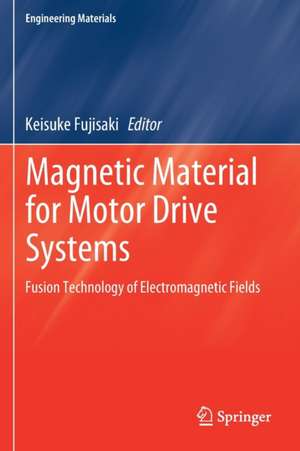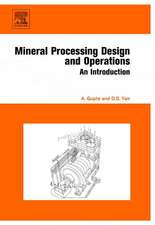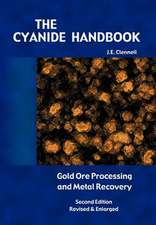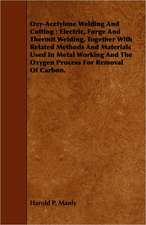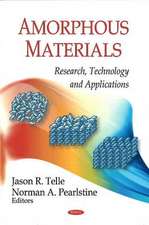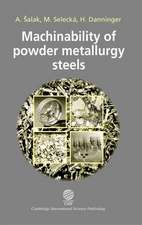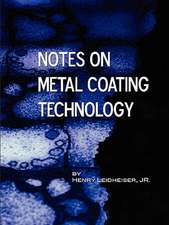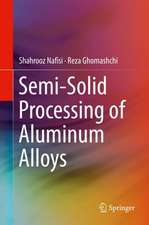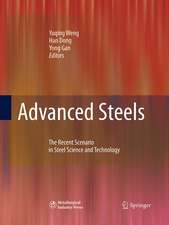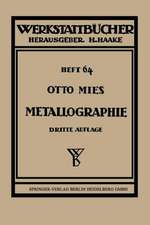Magnetic Material for Motor Drive Systems: Fusion Technology of Electromagnetic Fields: Engineering Materials
Editat de Keisuke Fujisakien Limba Engleză Paperback – 19 ian 2021
This book focuses on how to use magnetic material usefully for electrical motor drive system, especially electrical vehicles and power electronics. The contents have been selected in such a way that engineers in other fields might find some of the ideas difficult to grasp, but they can easily acquire a general or basic understanding of related concepts if they acquire even a rudimentary understanding of the selected contents.
The cutting-edge technologies of magnetism are also explained. From the fundamental theory of magnetism to material, equipment, and applications, readers can understand the underlying concepts. Therefore, a new electric vehicle from the point of view of magnetic materials or a new magnetic material from the point of a view of electric vehicles can be envisioned: that is, magnetic material for motor drive systems based on fusion technology of an electromagnetic field.
Magnetic material alone does not make up an electric vehicle, of course. Other components such as mechanical structure material, semiconductors, fuel cells, and electrically conductive material are important, and they are difficult to achieve. However, magnetic material involves one of the most important key technologies, and there are high expectations for its use in the future. It will be the future standard for motor-drive system researchers and of magneticmaterial researchers as well. This book is a first step in that direction.
| Toate formatele și edițiile | Preț | Express |
|---|---|---|
| Paperback (1) | 1006.24 lei 6-8 săpt. | |
| Springer Nature Singapore – 19 ian 2021 | 1006.24 lei 6-8 săpt. | |
| Hardback (1) | 1012.53 lei 6-8 săpt. | |
| Springer Nature Singapore – 11 dec 2019 | 1012.53 lei 6-8 săpt. |
Din seria Engineering Materials
- 18%
 Preț: 1390.89 lei
Preț: 1390.89 lei - 18%
 Preț: 1236.99 lei
Preț: 1236.99 lei - 24%
 Preț: 829.35 lei
Preț: 829.35 lei - 18%
 Preț: 1001.02 lei
Preț: 1001.02 lei - 20%
 Preț: 573.70 lei
Preț: 573.70 lei - 17%
 Preț: 490.23 lei
Preț: 490.23 lei - 18%
 Preț: 891.33 lei
Preț: 891.33 lei - 15%
 Preț: 644.95 lei
Preț: 644.95 lei - 18%
 Preț: 892.90 lei
Preț: 892.90 lei - 18%
 Preț: 1384.75 lei
Preț: 1384.75 lei - 18%
 Preț: 1002.61 lei
Preț: 1002.61 lei -
 Preț: 343.98 lei
Preț: 343.98 lei - 18%
 Preț: 997.09 lei
Preț: 997.09 lei - 18%
 Preț: 1106.00 lei
Preț: 1106.00 lei - 18%
 Preț: 1120.99 lei
Preț: 1120.99 lei - 15%
 Preț: 703.85 lei
Preț: 703.85 lei - 15%
 Preț: 658.05 lei
Preț: 658.05 lei - 18%
 Preț: 889.75 lei
Preț: 889.75 lei - 18%
 Preț: 946.55 lei
Preț: 946.55 lei - 18%
 Preț: 1396.43 lei
Preț: 1396.43 lei - 18%
 Preț: 1101.26 lei
Preț: 1101.26 lei - 17%
 Preț: 428.09 lei
Preț: 428.09 lei - 18%
 Preț: 1111.85 lei
Preț: 1111.85 lei - 18%
 Preț: 1588.67 lei
Preț: 1588.67 lei -
 Preț: 388.45 lei
Preț: 388.45 lei - 20%
 Preț: 566.87 lei
Preț: 566.87 lei - 18%
 Preț: 949.42 lei
Preț: 949.42 lei - 15%
 Preț: 631.72 lei
Preț: 631.72 lei - 15%
 Preț: 640.88 lei
Preț: 640.88 lei - 15%
 Preț: 635.47 lei
Preț: 635.47 lei - 18%
 Preț: 1233.20 lei
Preț: 1233.20 lei - 18%
 Preț: 1548.11 lei
Preț: 1548.11 lei - 18%
 Preț: 1126.03 lei
Preț: 1126.03 lei - 15%
 Preț: 638.11 lei
Preț: 638.11 lei - 15%
 Preț: 637.46 lei
Preț: 637.46 lei - 18%
 Preț: 1217.10 lei
Preț: 1217.10 lei - 18%
 Preț: 945.62 lei
Preț: 945.62 lei - 18%
 Preț: 948.61 lei
Preț: 948.61 lei - 18%
 Preț: 1224.54 lei
Preț: 1224.54 lei -
 Preț: 367.93 lei
Preț: 367.93 lei - 15%
 Preț: 639.25 lei
Preț: 639.25 lei - 15%
 Preț: 643.34 lei
Preț: 643.34 lei - 18%
 Preț: 955.08 lei
Preț: 955.08 lei - 15%
 Preț: 645.79 lei
Preț: 645.79 lei - 18%
 Preț: 1237.30 lei
Preț: 1237.30 lei - 18%
 Preț: 1114.34 lei
Preț: 1114.34 lei - 18%
 Preț: 1217.10 lei
Preț: 1217.10 lei
Preț: 1006.24 lei
Preț vechi: 1227.11 lei
-18% Nou
Puncte Express: 1509
Preț estimativ în valută:
192.55€ • 205.90$ • 160.54£
192.55€ • 205.90$ • 160.54£
Carte tipărită la comandă
Livrare economică 18 aprilie-02 mai
Preluare comenzi: 021 569.72.76
Specificații
ISBN-13: 9789813299085
ISBN-10: 9813299088
Pagini: 440
Ilustrații: IX, 440 p. 323 illus., 188 illus. in color.
Dimensiuni: 155 x 235 mm
Greutate: 0.63 kg
Ediția:1st ed. 2019
Editura: Springer Nature Singapore
Colecția Springer
Seria Engineering Materials
Locul publicării:Singapore, Singapore
ISBN-10: 9813299088
Pagini: 440
Ilustrații: IX, 440 p. 323 illus., 188 illus. in color.
Dimensiuni: 155 x 235 mm
Greutate: 0.63 kg
Ediția:1st ed. 2019
Editura: Springer Nature Singapore
Colecția Springer
Seria Engineering Materials
Locul publicării:Singapore, Singapore
Cuprins
Motor Drive System and Magnetic Material: Constitution of this book.- New Magnetic Material Requirement for Motor Drive System.- Magnetic Material.- Electrical Motor.- Power Electronics.- Electromagnetic Fusion Technology: Fusion of machine, application and material.- Magnetic Property excited by PWM Inverter.- Motor Core Loss Property Excited by Inverter.- Electrical Motor Applied by Low Iron Loss Magnetic Material.- Fundamental Theory for New Magnetic Material.- Magnetic Structure and Micromagnetics Calculation.- Polycristal Magnetic Modeling.- Magnetic Hysteresis Modeling by Play Model.- Magnetic Hysteresis Modeling by Thermo-Dynamic Model.- Equivalent Electrical Circuit Expression for High Frequency Electromagnetic Characteristics.- Combined Analysis Model of Power Semiconductor and Magnetic Characteristics.- Two-Dimensional Vector Magnetic Property.- Now and Future of Magnetic Material: Technical History of Magnetic Material and Permanent Magnet.- Low Loss Soft Magnetic Materials.- Sintered NdFeB Magnet.- Bonded NdFeB Magnet.- Rare Earth Problem for Permanent Magnets.- High Frequency Magnetic Characteristics.- Iron Loss Calculation of Electrical Motor.- Inductance Core Loss.- Magnetic Application for Automobile Car.- Magnetic Application in Linear Motor.
Notă biografică
Keisuke Fujisaki (S'82–M’83–SM'02, IEEE) received the B. Eng., degree in electronics engineering from the Faculty of Engineering, The University of Tokyo, Tokyo, Japan, in 1981 and M.Eng., and Dr.Eng. degrees from Graduate school of the University of Tokyo, Tokyo, Japan, in 1983 and 1986, respectively. From 1986 to 1991, he conducted research on electromagnetic force applications to steel-making plants at the Ohita Works, Nippon Steel Corporation. From 1991 to 2010, he has been with the Technical Development Bureau, Nippon Steel Corporation, Futtsu, Japan. Since 2010, he was a professor of Toyota Technological Institute. His current scientific interests are magnetic multi-scale, electromagnetic multi-physics, high efficient motor drive system, electrical motor, and power electronics. In 2002–2003, he was a Visiting Professor at Ohita University. In 2003-2009, he was a Visiting Professor at Tohoku University. Dr. Fujisaki received the Outstanding Prize Paper Award at the Metal Industry Committee sessions of the 2002 IEEE Industry Applications Society Annual Meeting.
Textul de pe ultima copertă
This book focuses on how to use magnetic material usefully for electrical motor drive system, especially electrical vehicles and power electronics. The contents have been selected in such a way that engineers in other fields might find some of the ideas difficult to grasp, but they can easily acquire a general or basic understanding of related concepts if they acquire even a rudimentary understanding of the selected contents.
The cutting-edge technologies of magnetism are also explained. From the fundamental theory of magnetism to material, equipment, and applications, readers can understand the underlying concepts. Therefore, a new electric vehicle from the point of view of magnetic materials or a new magnetic material from the point of a view of electric vehicles can be envisioned: that is, magnetic material for motor drive systems based on fusion technology of an electromagnetic field.
Magnetic material alone does not make up an electric vehicle, of course. Other components such as mechanical structure material, semiconductors, fuel cells, and electrically conductive material are important, and they are difficult to achieve. However, magnetic material involves one of the most important key technologies, and there are high expectations for its use in the future. It will be the future standard for motor-drive system researchers and of magnetic material researchers as well. This book is a first step in that direction.
Caracteristici
Proposes selected basic concepts of magnetism and motor drive systems Describes fusion technology of electric motors, power electronics, and magnetic material Introduces the supporting technology both as numerical calculations and as measurements
